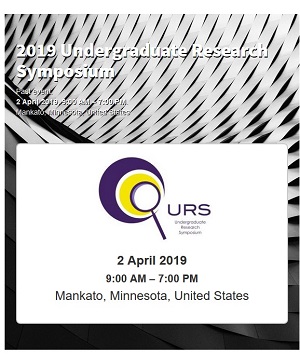Preparing Undergraduate Students in a Science Course to be Interculturally Competent
Location
CSU 203
Start Date
2-4-2019 11:05 AM
End Date
2-4-2019 12:05 PM
Student's Major
Elementary and Literacy Education Department
Student's College
Education
Mentor's Name
Elizabeth Sandell
Mentor's Department
Elementary and Literacy Education Department
Mentor's College
Education
Second Mentor's Name
Bethann Lavoie
Second Mentor's Department
Biological Sciences
Second Mentor's College
Science, Engineering and Technology
Description
The mission of the College of Science, Engineering, and Technology is to “prepare students for professional careers and advanced study, while connecting with local, regional and global communities” (MSU, Mankato, 2018). Faculty members face a significant challenge: preparing the next generation of increasingly diverse scientists. Culturally responsive teaching uses “the cultural knowledge, prior experiences, frames of reference, and performance styles of ethnically diverse students to make learning encounters more relevant to and effective for them” (Gay, 2010, p. 31). The current investigation hypothesized that course experiences may have a positive impact on the intercultural competence of undergraduate students. This investigation will report on the starting level of intercultural competence among undergraduate students. The next step will examine how the students change during their experiences in the course. For this study, the IDI version 3 (Hammer, Bennett, & Wiseman, 2003) was used as a measure of cultural competency. The investigators hypothesized that beginning scores are influenced by the students' lack of experiences with other cultures. Researchers anticipate that the scores will increase as a result of participating in the course. College and university leaders will use the results for course design and for procedural recommendations.
Preparing Undergraduate Students in a Science Course to be Interculturally Competent
CSU 203
The mission of the College of Science, Engineering, and Technology is to “prepare students for professional careers and advanced study, while connecting with local, regional and global communities” (MSU, Mankato, 2018). Faculty members face a significant challenge: preparing the next generation of increasingly diverse scientists. Culturally responsive teaching uses “the cultural knowledge, prior experiences, frames of reference, and performance styles of ethnically diverse students to make learning encounters more relevant to and effective for them” (Gay, 2010, p. 31). The current investigation hypothesized that course experiences may have a positive impact on the intercultural competence of undergraduate students. This investigation will report on the starting level of intercultural competence among undergraduate students. The next step will examine how the students change during their experiences in the course. For this study, the IDI version 3 (Hammer, Bennett, & Wiseman, 2003) was used as a measure of cultural competency. The investigators hypothesized that beginning scores are influenced by the students' lack of experiences with other cultures. Researchers anticipate that the scores will increase as a result of participating in the course. College and university leaders will use the results for course design and for procedural recommendations.
Recommended Citation
Koestler, Zachary. "Preparing Undergraduate Students in a Science Course to be Interculturally Competent." Undergraduate Research Symposium, Mankato, MN, April 2, 2019.
https://cornerstone.lib.mnsu.edu/urs/2019/oral-session-05/4




